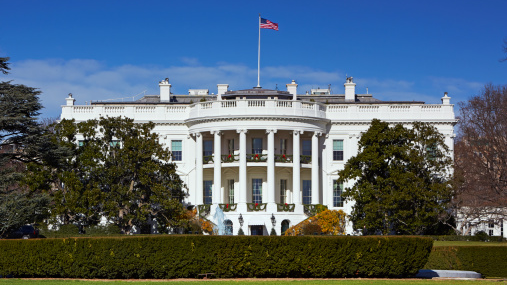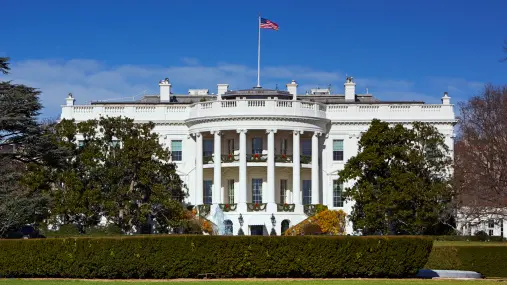
The White House in Washington, D.C., the U.S. /Getty
Editor's note: Josef Gregory Mahoney is a professor of politics at East China Normal University. The article reflects the author's opinions, and not necessarily the views of CGTN.
While the new U.S. administration's foreign policy is still coming into view, this past week saw American diplomats scurrying around Asia trying to find and represent new points of leverage against China ahead of the high-level talks that just concluded in Anchorage, Alaska. Given what we've seen thus far, how might we describe Biden's approach to China? I suggest four possibilities.
The three-handed Frankenstein
The first description is the "three-handed Frankenstein." Before Trump, Chinese leaders sometimes called America's approach "two-handed"—one hand extended in greeting, the other pulled back in a fist.
Under Trump, towards the end at least, the U.S.was reduced to one hand pulled back in a fist, the other was too busy begging for food, fighting off police brutality or covering a cough from COVID-19.
When Biden took charge, many sensed the U.S.was moving back to the familiar two-handed stance. In fact, we now see three hands. One calls for cooperation, one aims to competeand a third pursues containment.
This might seem logical and reasonable from the White House's point of view, particularly as Biden finds his foreign policy still being shaped by Trump and his ideologues in Congress. To wit Blinken's aggressive opening marks ahead of talks in Alaska, which has gotten a lot of positive press from the usual Western sources, but also garnered some dismay.
But we shouldn't be too distracted by the tough talk. Most of that is just posturing by the Biden administration, trying to duck domestic criticism while appealing to countries like Japan and Australia that lack truly independent foreign policies, especially when it comes to China.
But is this in fact a viable U.S.foreign policy, or one that is imperiled by its own contradictions? Can one simultaneously cooperate, compete and contain? Only if China plays along with the monster's song.
Pragmatism or 'fragmatism?'
The second description is "pragmatism." This is normally described in positive ways by many in the English language, but as the British Marxist critic Raymond Williams wrote, "the word has been useful as a dignified alternative to unprincipled or timeserving, especially in political movements which profess a set of beliefs and which decide, under pressure, to neglect, discard or betray them, but with a show of skill and intelligence."
While some of us are quite partial to Williams' definition, a less critical description includes the idea that pragmatists will look to maximize their advantages as much as possible within an existing system, or at least, one that used to exist, without letting ideology beyond reasonable self-interest get in the way.
U.S. President Joe Biden. /Getty
Biden is frequently described as a pragmatist, at least by the people who like him, and he was closely associated with Obama, who apparently enjoyed the label himself.
But given the breakdowns and fragmentation of U.S.power and its fractured relations in tandem with its desire to fragment and fracture its competition, and given the desires that many others have to avoid escalating conflicts with China, this might not be a sincere pragmatism. Perhaps we need a new word: "fragmatism."
Beachball diplomacy
The third description is "beach-ball diplomacy." Gone are the days of ping-pong diplomacy, for if the two countries played that now, then certainly the Chinese side would "eat America's lunch," to paraphrase a recent alarmist quote from Biden. So let's give beach-ball a shot.
Sure, I know what you're thinking… Who's playing beach-ball in Anchorage in March, where temperatures are still sub-zero Celsius? But that's the thing about beachball diplomacy:it's more about dreams of the good times that were and those you hope will come again.
Here's how it works. You inflate a bunch of issues, some valid and some not, into one big ball and then play a game by trying to spike the ball over your opponent's net. With the U.S., we see inflating and exploiting China's domestic issues as international issues. And we see the U.S.trying to reestablish itself as the broker of Japanese, Australian and Canadian interests, among others. Wrap all this together and then hoot and holler and send the ball wafting shakily over the net as hard as you can.
However, it doesn't seem the Chinese came to play games, or that they much fear a beach-ball. Who would? But perhaps this is what Biden means when he talks about competing.
Old-fashioned hegemony
The fourth description is old-fashioned hegemony, pure and simple. Try to reestablish military and economic controls wherever possible. Play a big strategic game targeting Russia and China and others who resist. Hold everyone to standards higher than those you hold for yourself, punish them when they fall short and pretend you've done the world a favor in the meantime. Demonize adversaries. Pursue regime change. Leave countries if not regions in ruins. And then further neglect them during a global health crisis.
Whether this is called "America first" or "America's back," either way it's merely "might makes right" masquerading as a moral high ground that few believe anymore, including many Americans. And that's the litmus of the litmus: American thinking abroad has finally circled back and bit itself on the ass.
The problem with American hegemony today isn't that the U.S.lacks a potent military or a commander-in-chief Constitutionally empowered to act imperialistically around the world. It's that he has little to no legitimacy among almost half his country's voters and half the U.S.Senate. It's that he hasn't yet established his own independent foreign policy and that half or more of his allies no longer trust the U.S.to be a reliable partner.
One might suggest the U.S.should learn how to rule itself again before it tries to rule others, but that really obscures the key issue. Perhaps the U.S.can no longer rule itself because its capacity to manipulate others internationally has been so severely diminished. Is that not the be-all-end-all of imperialism? Take away the empire and only the rump is left.
(If you want to contribute and have specific expertise, please contact us at [email protected].)
 简体中文
简体中文







